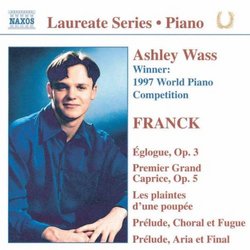| All Artists: Cesar Franck, Ashley Wass Title: Franck: Music for Piano Members Wishing: 0 Total Copies: 0 Label: Naxos Release Date: 1/25/2000 Genres: Dance & Electronic, Classical Styles: Opera & Classical Vocal, Ballets & Dances, Dances, Chamber Music, Forms & Genres, Short Forms, Historical Periods, Classical (c.1770-1830), Instruments, Keyboard Number of Discs: 1 SwapaCD Credits: 1 UPC: 636943448427 |
Search - Cesar Franck, Ashley Wass :: Franck: Music for Piano
 | Cesar Franck, Ashley Wass Franck: Music for Piano Genres: Dance & Electronic, Classical
|
Larger Image |
CD Details |
CD ReviewsGreat addition to the Franck discography Hexameron | 01/19/2007 (4 out of 5 stars) "I first discovered Cesar Franck through the Marco Polo label's recording with Alexander Paley. The best of the best of Franck is featured on that disc; it simply blew me away. I had no idea how powerful Franck's music was until then. Therefore, I've only been familiar with one piece here, the Prelude, Choral and Fugue, before buying this CD. The rest are new to my ears and I think they are actually quite good. I've never heard Ashley Wass, but he plays with an extremely Romantic style, proficient with storming octaves, rumbling tremolos, delicate trills and passionate interpretations of the tender phrases. The Eglogue Op. 3 is an epic (nearly 17 minute) work that essentially has a dramatic inner core framed by the pervading tranquility of the outer sections. The beautiful serenity of these outer sections require careful listening. The exquisite beauties of these nocturne-like sections have to be re-listened to before they can be appreciated, at least in my experience. The only sidetrack takes place in a dramatic Allegro fuocoso interlude where you can expect some pianistic excitement. It's brief, though, and the calm serenity returns to finish the piece. Franck was 21 when he wrote it, but it sounds more mature and refined than we might expect from a youth. The Premier Grand Caprice Op. 5 is the most virtuosic piece here, blazing with Lisztian octaves and Chopinesque decorations. Having heard most of Liszt's works from the Hyperion series, I've never grown tired of the pianistic grandeur these piano virtuosi composers were capable of. Sometimes slandered with names like "showpieces" or "bombastic," Franck actually transcends the cliche "salon piece" to create a lively and thrilling virtuoso composition. The resplendent pianistic effects and bravura passages are all tasteful and especially melodic. The superior composition recorded here must be the colossal Prelude, Choral and Fugue M.21, a work of such depth, emotion, and Busonian intellect. I've only heard Alexander Paley's interpretation, but Wass is in full-form. He combines the appropriate reflective mood and fiery outbursts to make this work poignant and memorable. The Prelude is surrounded by mysterious walls of sound and passionate swirls of harmonies. The Chorale gets even better, with exploration into the deeper sonorities of the piano. The melancholy and haunting descending theme is just excellent. The Fugue reaches an explosive climax; the music becomes an unstoppable force. Franck's keyboard virtuosity is best represented here. Perhaps this was one of the reasons why Liszt coined him the "French Bach." The Prelude, Aria, and Final is another fascinating composition. The Prelude lacks the supreme music content that was found in the M.21, but it is an engaging piece that takes its time to unfold. Several melodies occasionally show their face and provide a nice contrast from the dissonance. Wass displays his endurance and patience with dynamics; the whole piece is an exercise in contrasting quiet with loud. The Aria has its beautiful moments and seems to float endlessly through conjunct melodies. I think the Final is the most unique of them all. Franck harkens back to his exciting virtuosic side. Like I said earlier, Franck knows how to create decent tempestuous works. He never settles for empty fireworks and always has something new to say with his furious passages. The least interesting works on here are the Les plaintes d'une poupee and the Danse lente. Both are relatively short. A Doll's Lament is childlike, texturally simple, but not wholly bad. Its music box-like melancholy is actually prettier than some of Faure or Debussy. The Danse lente, composed in 1885, is a gloomy and seductive waltz. Again, it's not bad, but it's not outstanding either. Bottom line: There are new pieces here for the Franck piano fan to enjoy. For those new to Franck, I wouldn't recommend this disc, but instead advise getting the Marco Polo label's Franck Piano Transcriptions. Nonetheless, there are magnificent works here that are given stellar interpretations. Conclusively, this disc is mostly for the Franck completist." Mystery Canzone | California | 08/29/2006 (4 out of 5 stars) "The good: I really like this CD a lot. The piano sound is just right, not clangy and brassy as some Naxos piano recordings are. And Wass has just the right touch and feel for Franck; it's easy to understand why he is so highly regarded.
The bad: Naxos (again) doesn't get the balance right, perhaps because the miking is too close. If you set the volume high enough to hear the very quiet passages, the lounder sections can be uncomfortable. The mystery: I don't have another recording, or score, available for comparison, but the 'Aria' section of the Prelude, Aria et Final piece is listed as 6.33 minutes in length; however, it really sounds as though it ends at about 6:05. Is there music missing, is the CD defective, or is this just a printing anomaly?? Whatever, it's a really lovely recording." |

 Track Listings (10) - Disc #1
Track Listings (10) - Disc #1